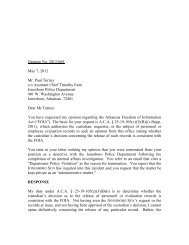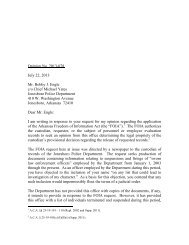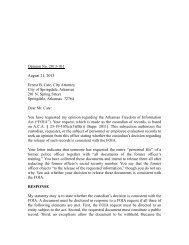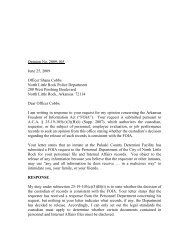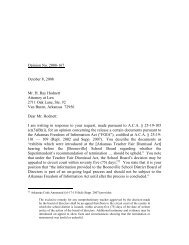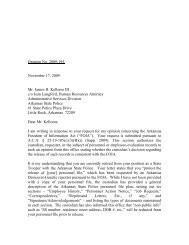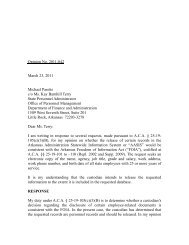Opinion No. 2011-055 April 29, 2011 Mr. Michael W. Frey Camden ...
Opinion No. 2011-055 April 29, 2011 Mr. Michael W. Frey Camden ...
Opinion No. 2011-055 April 29, 2011 Mr. Michael W. Frey Camden ...
Create successful ePaper yourself
Turn your PDF publications into a flip-book with our unique Google optimized e-Paper software.
<strong>Opinion</strong> <strong>No</strong>. <strong>2011</strong>-<strong>055</strong><br />
<strong>April</strong> <strong>29</strong>, <strong>2011</strong><br />
<strong>Mr</strong>. <strong>Michael</strong> W. <strong>Frey</strong><br />
<strong>Camden</strong> City Attorney<br />
117 Jefferson SW<br />
<strong>Camden</strong>, Arkansas 71701<br />
Dear <strong>Mr</strong>. <strong>Frey</strong>:<br />
You have requested my opinion regarding the Arkansas Freedom of Information<br />
Act (“FOIA”). Your request, which is made as the attorney for the custodian, is<br />
based on A.C.A. § 25-19-105(c)(3)(B)(i) (Supp. 2009), which authorizes the<br />
custodian, requester, or the subject of personnel or employee evaluation records to<br />
seek an opinion from this office stating whether the custodian’s decision regarding<br />
the release of such records is consistent with the FOIA.<br />
Your letter indicates that someone has requested records pertaining to “any<br />
internal affairs investigations regarding” two officers. I assume the two records<br />
attached to your opinion request constitute all the records that the custodian<br />
believes are responsive to this request. The custodian has determined that one<br />
document—a letter detailing one officer’s suspension, must be disclosed—while<br />
the other document—a reprimand letter—must be withheld. You ask whether<br />
these two decisions are consistent with the FOIA.<br />
RESPONSE<br />
My statutory duty is to state whether the decision of the custodian of records is<br />
consistent with the FOIA. Having reviewed the records, it is my opinion (1) that<br />
the custodian has correctly classified the two records as employee-evaluation<br />
records; and (2) that the custodian has correctly determined that the suspension<br />
letter must be released, while the reprimand letter must be withheld.
<strong>Michael</strong> W. <strong>Frey</strong><br />
<strong>Camden</strong> City Attorney<br />
<strong>Opinion</strong> <strong>2011</strong>-<strong>055</strong><br />
Page 2<br />
DISCUSSION<br />
I. General standards governing disclosure.<br />
A document must be disclosed in response to a FOIA request if all three of the<br />
following elements are met. First, the FOIA request must be directed to an entity<br />
subject to the act. Second, the requested document must constitute a public record.<br />
Third, no exceptions allow the document to be withheld.<br />
The first two elements appear met in this case. As for the first element, the<br />
documents are held by the police department, which is a public entity. As for the<br />
second element, the FOIA defines “public record” as:<br />
writings, recorded sounds, films, tapes, electronic or computer-based<br />
information, or data compilations in any medium, required by law to<br />
be kept or otherwise kept, and which constitute a record of the<br />
performance or lack of performance of official functions which are<br />
or should be carried out by a public official or employee, a<br />
governmental agency, or any other agency wholly or partially<br />
supported by public funds or expending public funds. All records<br />
maintained in public offices or by public employees within the scope<br />
of their employment shall be presumed to be public records. 1<br />
The two documents you have attached clearly constitute a record of the<br />
performance or lack of performance of the official functions of both the reviewing<br />
officer and the two officers being reviewed. Accordingly, both documents are<br />
public records and must, therefore, must be released unless some specific<br />
exception shields them from disclosure.<br />
II.<br />
Exceptions to disclosure.<br />
The custodian has apparently determined that both records meet the definition of<br />
an employee-evaluation record, which is a type of public record commonly found<br />
1 A.C.A. § 25-19-103(5)(A) (Supp. 2009).
<strong>Michael</strong> W. <strong>Frey</strong><br />
<strong>Camden</strong> City Attorney<br />
<strong>Opinion</strong> <strong>2011</strong>-<strong>055</strong><br />
Page 3<br />
in employees’ personnel files. 2 While the FOIA does not define “employeeevaluation<br />
or job performance record,” this office has consistently opined that the<br />
phrase refers to records that were created by (or at the behest of) the employer that<br />
detail the employee’s performance or lack of performance on the job. 3 This<br />
exception includes records generated while investigating allegations of employee<br />
misconduct that detail incidents that gave rise to an allegation of misconduct. 4<br />
In this instance, both public records you have attached clearly meet the definition<br />
of an employee-evaluation record because both records were created by (or at the<br />
behest of) the employer to evaluate the named officers.<br />
When a public record qualifies as an employee-evaluation record, the document<br />
cannot be released unless all of the following elements have been met:<br />
1. The employee was suspended or terminated (i.e., level of discipline);<br />
2. There has been a final administrative resolution of the suspension or<br />
termination proceeding (i.e., finality);<br />
3. The records in question formed a basis for the decision made in that<br />
proceeding to suspend or terminate the employee (i.e., relevance);<br />
and<br />
4. The public has a compelling interest in the disclosure of the records<br />
in question (i.e., compelling interest). 5<br />
2<br />
The FOIA describes these records in A.C.A. § 25-19-105(c)(1): “<strong>No</strong>twithstanding subdivision<br />
(b)(12) of this section, all employee evaluation or job performance records, including preliminary<br />
notes and other materials, shall be open to public inspection only upon final administrative<br />
resolution of any suspension or termination proceeding at which the records form a basis for the<br />
decision to suspend or terminate the employee and if there is a compelling public interest in their<br />
disclosure.”<br />
3 Op. Att’y Gen. 2004-012 (and opinions cited therein).<br />
4 Id.<br />
5 A.C.A. § 25-19-105(c)(1) (Supp. 2009); Op. Att’y Gen. 2008-065.
<strong>Michael</strong> W. <strong>Frey</strong><br />
<strong>Camden</strong> City Attorney<br />
<strong>Opinion</strong> <strong>2011</strong>-<strong>055</strong><br />
Page 4<br />
As for the final prong, the FOIA never defines the key phrase “compelling public<br />
interest.” But two leading commentators on the FOIA, referring to this office’s<br />
opinions, have offered the following guidelines:<br />
[I]t seems that the following factors should be considered in<br />
determining whether a compelling public interest is present: (1) the<br />
nature of the infraction that led to suspension or termination, with<br />
particular concern as to whether violations of the public trust or<br />
gross incompetence are involved; (2) the existence of a public<br />
controversy related to the agency and its employees; and (3) the<br />
employee’s position within the agency. In short, a general interest in<br />
the performance of public employees should not be considered<br />
compelling, for that concern is, at least theoretically, always present.<br />
However, a link between a given public controversy, an agency<br />
associated with the controversy in a specific way, and an employee<br />
within the agency who commits a serious breach of public trust<br />
should be sufficient to satisfy the “compelling public interest”<br />
requirement. 6<br />
These commentators also note that “the status of the employee” or “his rank<br />
within the bureaucratic hierarchy” may be relevant in determining whether a<br />
“compelling public interest” exists, 7 which is always a question of fact that must<br />
be determined, in the first instance, by the custodian after he considers all the<br />
relevant information.<br />
The primary purpose of this exception is to preserve the confidentiality of the<br />
formal job-evaluation process in order to promote honest exchanges in the<br />
employee/employer relationship. 8<br />
6 John J. Watkins & Richard J. Peltz, THE ARKANSAS FREEDOM OF INFORMATION ACT 217–18<br />
(internal citations omitted).<br />
7 Id. at 216 (noting that “[a]s a practical matter, such an interest is more likely to be present when<br />
a high-level employee is involved than when the [records] of ‘rank-and-file’ workers are at<br />
issue.”).<br />
8 Cf. Op. Att’y Gen. 96-168; Watkins & Peltz, supra, at 204.
<strong>Michael</strong> W. <strong>Frey</strong><br />
<strong>Camden</strong> City Attorney<br />
<strong>Opinion</strong> <strong>2011</strong>-<strong>055</strong><br />
Page 5<br />
In this instance, the four-part test must be separately applied to each employeeevaluation<br />
record, just as the custodian has done. Under this test, the custodian’s<br />
decision to withhold the letter-of-reprimand is consistent with the FOIA because<br />
the letter is not relevant to a final suspension or termination proceeding. Likewise,<br />
the custodian’s decision with respect to the suspension letter is consistent with the<br />
FOIA because all of the conditions for release are clearly met. There is no question<br />
that the first three elements are met. And, as for the fourth element, this office has<br />
consistently opined that, with respect to allegations of police misconduct, a<br />
compelling public interest likely exists in information reflecting a violation of<br />
departmental rules by a “cop on the beat” in his interactions with the public. Given<br />
that the disciplinary record indicates that such an infraction occurred, the<br />
custodian’s determination—that the public has a compelling interest in the<br />
records—is consistent with the FOIA, in my opinion.<br />
Assistant Attorney General Ryan Owsley prepared this opinion, which I hereby<br />
approve.<br />
Sincerely,<br />
DUSTIN MCDANIEL<br />
Attorney General<br />
DM/RO:cyh



